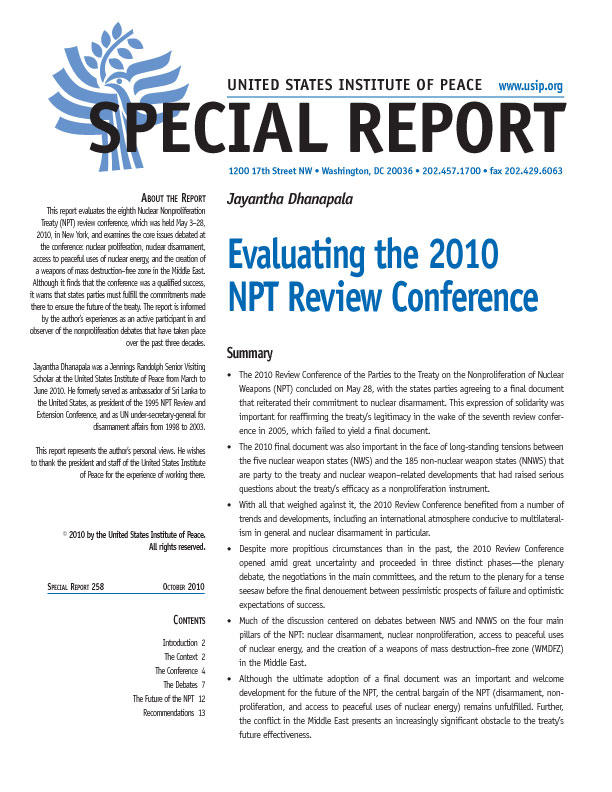This report evaluates the eighth Nuclear Nonproliferation Treaty (NPT) review conference, which was held May 3–28, 2010, in New York, and examines the core issues debated at the conference: nuclear proliferation, nuclear disarmament, access to peaceful uses of nuclear energy, and the creation of a weapons of mass destruction–free zone in the Middle East.

Summary
- The 2010 Review Conference of the Parties to the Treaty on the Nonproliferation of Nuclear Weapons (NPT) concluded on May 28, with the states parties agreeing to a final document that reiterated their commitment to nuclear disarmament. This expression of solidarity was important for reaffirming the treaty’s legitimacy in the wake of the seventh review conference in 2005, which failed to yield a final document.
- The 2010 final document was also important in the face of long-standing tensions between the five nuclear weapon states (NWS) and the 185 non-nuclear weapon states (NNWS) that are party to the treaty and nuclear weapon–related developments that had raised serious questions about the treaty’s efficacy as a nonproliferation instrument.
- With all that weighed against it, the 2010 Review Conference benefited from a number of trends and developments, including an international atmosphere conducive to multilateralism in general and nuclear disarmament in particular.
- Despite more propitious circumstances than in the past, the 2010 Review Conference opened amid great uncertainty and proceeded in three distinct phases—the plenary debate, the negotiations in the main committees, and the return to the plenary for a tense seesaw before the final denouement between pessimistic prospects of failure and optimistic expectations of success.
- Much of the discussion centered on debates between NWS and NNWS on the four main pillars of the NPT: nuclear disarmament, nuclear nonproliferation, access to peaceful uses of nuclear energy, and the creation of a weapons of mass destruction–free zone (WMDFZ) in the Middle East.
- Although the ultimate adoption of a final document was an important and welcome development for the future of the NPT, the central bargain of the NPT (disarmament, nonproliferation, and access to peaceful uses of nuclear energy) remains unfulfilled. Further, the conflict in the Middle East presents an increasingly significant obstacle to the treaty’s future effectiveness.
- Good-faith implementation of the document’s action plan will be crucial for keeping the nonproliferation regime from fraying, as will progress on the new Strategic Arms Reduction Treaty and ratification of the Comprehensive Nuclear Test Ban Treaty by the United States.
- The future course of the Six-Nation Talks on North Korea, the resolution of the questions about Iran’s nuclear program, and the outcomes of the 2012 conference on a WMDFZ in the Middle East will also determine the future of the NPT.
About the Report
This report evaluates the eighth Nuclear Nonproliferation Treaty (NPT) review conference, which was held May 3–28, 2010, in New York, and examines the core issues debated at the conference: nuclear proliferation, nuclear disarmament, access to peaceful uses of nuclear energy, and the creation of a weapons of mass destruction–free zone in the Middle East. Although it finds that the conference was a qualified success, it warns that states parties must fulfill the commitments made there to ensure the future of the treaty. The report is informed by the author’s experiences as an active participant in and observer of the nonproliferation debates that have taken place over the past three decades.
Jayantha Dhanapala was a Jennings Randolph Senior Visiting Scholar at the United States Institute of Peace from March to June 2010. He formerly served as ambassador of Sri Lanka to the United States, as president of the 1995 NPT Review and Extension Conference, and as UN under-secretary-general for disarmament affairs from 1998 to 2003.
This report represents the author’s personal views. He wishes to thank the president and staff of the United States Institute of Peace for the experience of working there.